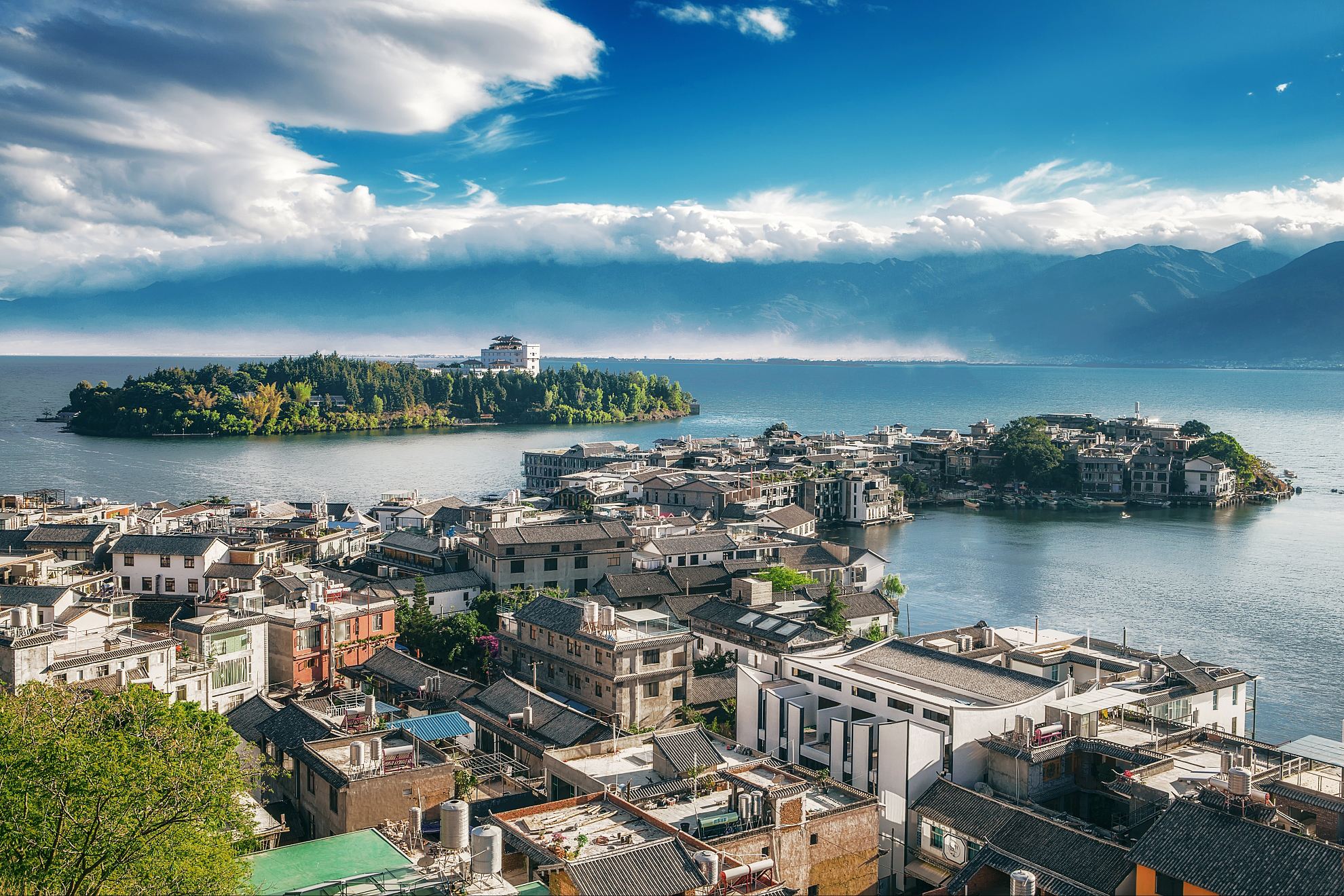24 Hours Hotline: +8613735411378
Email:chengdu@tripstoshanghai.com
24 Hours Hotline: +8613735411378
Email:chengdu@tripstoshanghai.com

Overview
Dali City, formerly known as Tali, is the county-level seat of the Dali Bai Autonomous Prefecture in northwestern Yunnan. Dali City is administered through 12 township-level districts, two of which are also commonly referred to as Dali.
Xiaguan (???) is the modern city centre and usually conflated with Dali City by virtue of being its seat. This town is the destination of most long-distance transportation heading to Dali and is sometimes referred to as Dali New Town (????) to avoid confusion.
Dali Town (???) is another division of Dali City, located 10 km to the north of Xiaguan. This town, commonly referred to as Dali Old Town (????) to distinguish it from the city seat in Xiaguan, is usually the Dali referred to in tourist publications. The old town is one of the most popular tourist destinations in Yunnan, known for its natural scenery, historical and cultural heritage, and vibrant nightlife.
History & Background
The Dali area was formerly known as Jumie (??). The old town was the medieval capital of both the Bai kingdom Nanzhao (fl.?8th and 9th centuries) and the Kingdom of Dali (937–1253). That city was razed and its records burnt during its conquest by China's Mongolian Yuan Dynasty. The present old town was organized in the late 14th century under the Hongwu Emperor of the Ming Dynasty. The area became significantly Muslim (Hui) under the Yuan and Ming and was the center of the Panthay Rebellion against the Qing from 1856–1863. It was severely damaged during a massive earthquake in 1925.
Rail and then air transport have permitted the area (particularly Dali Old Town) to become accessible to tourists in the 20th century. It is now one of China's official tourist cities and, along with nearby Lijiang, one of the most popular towns. In order to preserve the appeal of the old town, industrial development is restricted to newer townships such as Xiaguan. Building codes mandate that new construction in the old town and surrounding countryside must conform to the traditional Chinese style, with tiled roofs and bricks, plaster, or white-washed walls.

Geography
Dali City is located in western Yunnan, approximately 250 km northwest of the provincial capital of Kunming.
Dali is situated in the transition area between the dramatic valleys of the eastern Tibetan Plateau and the distinctive mountains of the western Yungui Plateau. The county-level city surrounds Erhai Lake between the Cang Mountains to the west and Mount Jizu to the east. The county seat at Xiaguan is located at the outlet of the lake into the Yangbi River. Dali Old Town is situated on a fertile plain between the Cang Range and Erhai. This plain has traditionally been settled by the Bai and Yi minorities.
Climate
Its low latitude tempered by its high elevation, Dali has a mild subtropical highland climate (K?ppen Cwb) with short, mild, dry winters and warm, rainy summers. Frost may occur in winter but the days still generally warm up to 16 °C (61 °F) or more. During summer, a majority of the days features some rainfall and daytime temperatures rise to 25 °C (77 °F). A great majority of the year's rainfall occurs from June to October. December 2013 was particularly marked for its high snowfall.
Transportation
Local transport
Local transport includes buses, taxis, bicycles, and boats on Erhai Lake. Local busses 4 & 8 provide service from Xiaguan to the old town (1 hr). Tourists often rent bicycles from one of the many rental stores in the old town and explore the region by bike, for instance on a special bike trail around the Erhai lake.
Air
Dali Airport (DLU) is a domestic airport about 13 km (8.1 mi) east of Xiaguan on Weishan or Airport Rd. Taxis run about 60 RMB to Xiaguan or 90 RMB to the old town.[citation needed] It services (as of 2014) Kunming (20 min), Xishuangbanna (25 min), Chongqing (70 min), Chengdu (80 min), Shanghai, Beijing, Shenzhen, Guangzhou, and Guiyuan.
Road
Dali (i.e., Xiaguan) is connected to Kunming and points east by the Hangrui Expressway (G56), which also runs west to Ruili on the Burmese border. The Dali Expressway (G56??) is a spur connecting it with Lijiang. The road to the old town is China National Highway 214, which connects to the expresseway to Lijiang north of the lake. It also runs south from Xiaguan to Menghai near the Burmese border.
Long-distance busses run from the old town's west gate to Kunming (about 4? hrs), Lijiang, and Shangri-La. Every Monday, service is also available to Shaping for its market.
Long-distance busses run from Xiaguan's stations on Jianshe Road.
Rail
Dali (i.e., Xiaguan) has rail connections with daily service to Kunming via the Guangtong-Dali Railway and Lijiang via the Dali-Lijiang Railway. Service to Kunming usually consists of one train during the day and two trains running overnight, with sleeper cars. As the railway network expands in Yunnan, train service will become available to Shangri-La County and Ruili.
Source:Wiki
Prev: Dali Transportation
Next: No next link
Wechat: Chinaprivatetour
24 Hours Hotline:
+8613735411378
1 to 1 tailor-made service from our professional travel advisors for the most sophisticated
Constantly excellent reviews for attraction, hotel and service Competitive price
Local experts provide quality tours Best selected knowledgeable local guides Authentic local restaurants
7*24 hours available to create you a worry-free tour. No Hidden Fees and absolutely no pressure to buy. Secured







